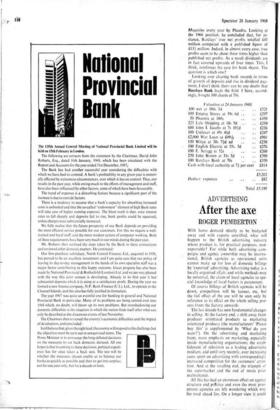After the axe
ADVERTISING ROGER PEMBERTON
With home demand sh'ortly to be budgeted away and with exports sanctified, What will happen to the British advertising industry whose product is, for practical purposes, non- exportable? For- while both advertising -cam- paigns and agency ownership may be interna- tional, British agencies as operational units cannot make up for loss of domestic billings by 'exported' advertising. Advertising today is a locally organised affair; and while methods may be universal, the claim of local agencies to spe- cial knowledge of local factors is paramount.
Of course billings of British agencies will be down, competition will be keener, etc, but the full effect of the axe will be seen only by reference to its effect on the whole selling pro- cess' from the factory onwards:
The last decade has seen fundamental change.; in selling. At the factory end, a shift away from producer orientated products to marketing orientated products (the manufacturers' Please buy this' is supplemented by 'What do you want?'). On the advertising and marketing front, more emphasis on marketing, especially inside Manufacturing organisations; the estab- lishment of television as a leading advertising medium, and until very recently, ever increasing sums spent on advertising with correspondingly increased competition for the customers' atten- tion. And at the retailing end, the triumph of the supermarket and the end of resale price maintenance.
All this has had an enormous effect on agency structure and prktice and even the most pros- perous agencies are left wondering which way the road ahead lies. On a longer view it could
also be claimed that because modern advertis- ing came to the ux in American dress, it has
constituted a larger part of the whole selling
effort than the logic of this compact market warranted. The nation of shopkeepers is a very
different market from the land of the free. Re- gardless4-therefore, of the more recent develop- ments outlined above, it is at least questionable whether media advertising should ever play as large a past in the 'marketing mix' here as in the us.
Now we await the budget. The late Lord Woolton, I am told, used to say that in his.
experience department stores prospered in times of depression because of their special reputation for value. Today it is not unreasonable to ex-
tend this thesis to supermarkets and the large retail chains. And this trend will further change- the shape of selling and hence of the advertising industry.
Where does all this leave the agencies? As.. has been said before, the agency business is a, ; two-way stretch, interpreting manufacturers, to customers and customers to manufacturers., In . this double role agencie,s have been of great, importance in improving industry's perfor, mance and getting the customer what he wants;.
and this job is as important today as it ever was.. Moreover, whatever services an agency may provide under the general heading of calcula- tion„ the essential service which only an inde- pendent organism such as an agency can con- , sistently provide is the imaginative or creative one—and this applies to both parts of the job.
On this definition the need for agency services is not changed by the immediate crisis. On the other hand, the range of actual products of an agency—from marketing reports to bottle label designs—is likely to change more rapidly than ever, with corresponding changes in the rela- tionships between manufacturers and agencies and media. And at the end of the day, the agen- cies will have a no less valuable but more logical role than ever before.



































 Previous page
Previous page